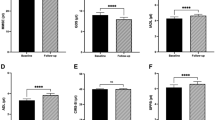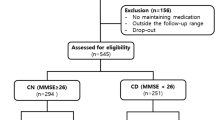Abstract
Background
Sacubitril, a neprilysin inhibitor in the combination molecule sacubitril/valsartan, slows down degradation of endogenous natriuretic peptides, thereby enhancing their beneficial cardiovascular effects. However, sacubitril might also promote neuronal dysfunction and cognitive impairment in patients with chronic heart failure (CHF) treated with sacubitril/valsartan, due to possible neprilysin inhibition at the level of Central Nervous System.
Methods
A retrospective cohort study was undertaken to detect the effects exerted by sacubitril/valsartan on cognitive function in CHF patients. The patients’ clinical data were examined for information provided in the Mini-Mental State Examination (MMSE), which was routinely administered during clinical visits at two centers from 15 March to 31 October 2017. Patients in the sacubitril/valsartan group had a clinical history of at least 3 months of continuous sacubitril/valsartan administration. The control group comprised CHF patients on conventional therapy not taking sacubitril/valsartan. In the between-group comparison, patients were matched for mean age, educational level, sex, NYHA class, and comorbidities. In the present retrospective study only patients in NYHA class II-III were enrolled.
Results
The mean MMSE score was 22.72 ± 2.68 (mean ± standard deviation [SD]) in the sacubitril/valsartan group (n = 51 patients) vs. 21.96 ± 2.73 (mean ± SD) in the control group (n = 51; p = 0.1572, independent samples t-test). Thus, a similar mild-to-moderate impairment in cognitive performance was found in the comparison between the two groups.
Conclusion
In our study, we did not find any evidence of the alleged harmful influence of sacubitril/valsartan on cognitive function. Patients taking sacubitril/valsartan for at least 3 months had similar mean MMSE scores to control subjects.
Zusammenfassung
Hintergrund
Sacubitril, ein Neprilysin-Inhibitor in dem Kombinationsmolekül Sacubitril/Valsartan, verlangsamt den Abbau endogener natriuretischer Peptide und verstärkt somit deren günstige kardiovaskuläre Wirkungen. Jedoch könnte Sacubitril auch neuronale Funktionsstörungen und kognitive Beeinträchtigungen bei Patienten mit chronischer Herzinsuffizienz begünstigen, die mit Sacubitril/Valsartan behandelt werden.
Methoden
Es wurde eine retrospektive Kohortenstudie durchgeführt, um die Wirkungen von Sacubitril/Valsartan auf die kognitiven Funktionen bei Patienten mit chronischer Herzinsuffizienz zu untersuchen. Dazu wurden die klinischen Daten der Patienten hinsichtlich Informationen zum Mini-Mental-Status-Test (MMST) ausgewertet, der routinemäßig in 2 Zentren bei der klinischen Visite zwischen 15. März und 31. Oktober 2017 durchgeführt wurde. Die Patienten in der Sacubitril/Valsartan-Gruppe wiesen eine klinische Vorgeschichte mit mindestens 3 Monate langer kontinuierlicher Gabe von Sacubitril/Valsartan auf. In der Kontrollgruppe befanden sich Patienten mit chronischer Herzinsuffizienz unter konventioneller Therapie ohne Sacubitril/Valsartan. Im Vergleich zwischen den beiden Gruppen wurden die Teilnehmer in Bezug auf Durchschnittsalter, Bildungsgrad, Geschlecht, Klasse gemäß NYHA (New York Heart Association) und Komorbiditäten abgeglichen.
Ergebnisse
Der durchschnittliche Wert im MMST betrug 22,72 ± 2,68 (Mittelwert, MW, ± Standardabweichung, „standard deviation“, SD) in der Sacubitril/Valsartan-Gruppe (n = 51 Patienten) vs. 21,96 ± 2,73 (MW ± SD) in der Kontrollgruppe (n = 51; p = 0,1572, t‑Test für unabhängige Stichproben). Somit stellte sich im Vergleich der beiden Gruppen eine ähnliche, leicht- bis mittelgradige Beeinträchtigung der kognitiven Leistungsfähigkeit heraus.
Schlussfolgerung
In der vorliegenden Studie fanden die Autoren keinen Beleg für die vermutete schädliche Wirkung von Sacubitril/Valsartan auf die kognitive Leistungsfähigkeit. Bei Patienten, die Sacubitril/Valsartan seit mindestens 3 Monaten einnahmen, waren die Durchschnittswerte im MMST ähnlich wie bei den Probanden der Kontrollgruppe.


Similar content being viewed by others
References
Campbell DJ (2017) Long-term neprilysin inhibition—implications for ARNIs. Nat Rev Cardiol 14(3):171–186
McMurray JJ, Packer M, Desai AS, Gong J, Lefkowitz MP, Rizkala AR, Rouleau JL, Shi VC, Solomon SD, Swedberg K, Zile MR, PARADIGM-HF Investigators and Committees. (2014) Angiotensin-neprilysin inhibition versus enalapril in heart failure. N Engl J Med 371:993–1004
www.medscape.com/viewarticle/851552: EMA Committee Backs Approval of Sacubitril/Valsartan (Entresto). Published on 25 September 2015
Guan H, Liu Y, Daily A, Police S, Kim MH, Oddo S, LaFerla FM, Pauly JR, Murphy MP (2009) Hersh LB Peripherally expressed neprilysin reduces brain amyloid burden: a novel approach for treating Alzheimer’s disease. J Neurosci Res 87(6):1462–1473
Kanemitsu H, Tomiyama T, Mori H (2003) Human neprilysin is capable of degrading amyloid beta peptide not only in the monomeric form but also the pathological oligomeric form. Neurosci Lett 350:113–116
Folstein MF, Folstein SE, McHugh PR (1975) “Mini-mental state”. A practical method for grading the cognitive state of patients for the clinician. J Psychiatr Res 12(3):189–198
van der Velpen IF, Yancy CW, Sorond FA, Sabayan B (2017) Impaired cardiac function and cognitive brain aging. Can J Cardiol 33(12):1587–1596
van Buchem MA, Biessels GJ, Brunner la Rocca HP, de Craen AJ, van der Flier WM, Ikram MA, Kappelle LJ, Koudstaal PJ, Mooijaart SP, Niessen W, van Oostenbrugge R, de Roos A, van Rossum AC, Daemen MJ (2014) The heart-brain connection: a multidisciplinary approach targeting a missing link in the pathophysiology of vascular cognitive impairment. J Alzheimers Dis 42(Suppl 4):S443–S451
Ogoh S (2017) Relationship between cognitive function and regulation of cerebral blood flow. J Physiol Sci 67(3):345–351
Čelutkienė J, Vaitkevičius A, Jakštienė S, Jatužis D (2016) Expert opinion-cognitive decline in heart failure: more attention is needed. Card Fail Rev 2(2):106–109
Debette S, Bauters C, Leys D, Lamblin N, Pasquier F, de Groote P (2007) Prevalence and determinants of cognitive impairment in chronic heart failure patients. Congest Heart Fail 13(4):205–208
Dodson JA, Truong TT, Towle VR, Kerins G, Chaudhry SI (2013) Cognitive impairment in older adults with heart failure: prevalence, documentation, and impact on outcomes. Am J Med 126(2):120–126
Levin SN, Hajduk AM, McManus DD, Darling CE, Gurwitz JH, Spencer FA, Goldberg RJ, Saczynski JS (2014) Cognitive status in patients hospitalized with acute decompensated heart failure. Am Heart J 168(6):917–923
Spencer B, Marr RA, Gindi R, Potkar R, Michael S, Adame A, Rockenstein E, Verma IM, Masliah E (2011) Peripheral delivery of a CNS targeted, metallo-protease reduces aβ toxicity in a mouse model of Alzheimer’s disease. PLoS ONE 6(1):e16575–31
Park MH, Lee JK, Choi S, Ahn J, Jin HK, Park JS, Bae JS (2013) Recombinant soluble neprilysin reduces amyloid-beta accumulation and improves memory impairment in Alzheimer’s disease mice. Brain Res 1529(5):113–124
Langenickel TH, Tsubouchi C, Ayalasomayajula S, Pal P, Valentin MA, Hinder M, Jhee S, Gevorkyan H, Rajman I (2016) The effect of LCZ696 (sacubitril/valsartan) on amyloid-β concentrations in cerebrospinal fluid in healthy subjects. Br J Clin Pharmacol 81(5):878–890
Schoenfeld HA, West T, Verghese PB, Holubasch M, Shenoy N, Kagan D, Buono C, Zhou W, DeCristofaro M, Douville J, Goodrich GG, Mansfield K, Saravanan C, Cumin F, Webb RL, Bateman RJ (2017) The effect of angiotensin receptor neprilysin inhibitor, sacubitril/valsartan, on central nervous system amyloid-β concentrations and clearance in the cynomolgus monkey. Toxicol Appl Pharmacol 323(15):53–65
Solomon SD, Rizkala AR, Gong J, Wang W, Anand IS, Ge J, Lam CSP, Maggioni AP, Martinez F, Packer M, Pfeffer MA, Pieske B, Redfield MM, Rouleau JL, Van Veldhuisen DJ, Zannad F, Zile MR, Desai AS, Shi VC, Lefkowitz MP, McMurray JJV (2017) Angiotensin receptor neprilysin inhibition in heart failure with preserved ejection fraction: rationale and design of the PARAGON-HF trial. Jacc Heart Fail 5(7):471–482
Iskandar ZM, Lang CC (2017) Sacubitril and valsartan fixed combination to reduce heart failure events in post-acute myocardial infarction patients. Drugs Today 53(10):545–551
Rigopoulos AG, Bakogiannis C, De Vecchis R, Sakellaropoulos S, Ali M, Teren M, Matiakis M, Tschoepe C, Noutsias M (2017) Acute heart failure: an unmet medical need. Herz. https://doi.org/10.1007/s00059-017-4626-6
Funding
All authors certify that no funding has been received for the conduct of this study and/or preparation of this manuscript.
Author information
Authors and Affiliations
Corresponding author
Ethics declarations
Conflict of interest
R. DeVecchis, C. Ariano, and G. DiBiase declare that they have no competing interests. M. Noutsias has received grants from the Deutsche Forschungsgemeinschaft (DFG) through the Sonderforschungsbereich Transregio 19 “Inflammatory Cardiomyopathy” (SFB TR19) (TP B2), and by the University Hospital Giessen and Marburg Foundation Grant “T Cell Functionality” (UKGM 10/2009). M. Noutsias has been consultant to the IKDT (Institute for Cardiac Diagnosis and Therapy GmbH, Berlin) 06/2004-06/2008, and has received honoraria for presentations and/or participated in advisory boards from AstraZeneca, Bayer, Boehringer Ingelheim, Fresenius, Miltenyi Biotech, Novartis, Pfizer, and Zoll.
This article does not contain any studies with human participants or animals performed by any of the authors.
Rights and permissions
About this article
Cite this article
De Vecchis, R., Ariano, C., Di Biase, G. et al. Cognitive performance of patients with chronic heart failure on sacubitril/valsartan. Herz 44, 534–540 (2019). https://doi.org/10.1007/s00059-018-4683-5
Received:
Revised:
Accepted:
Published:
Issue Date:
DOI: https://doi.org/10.1007/s00059-018-4683-5
Keywords
- Neprilysin inhibitor
- Cardiac insufficiency
- Adverse drug events
- Mini-Mental State Examination
- Neurologic manifestations




